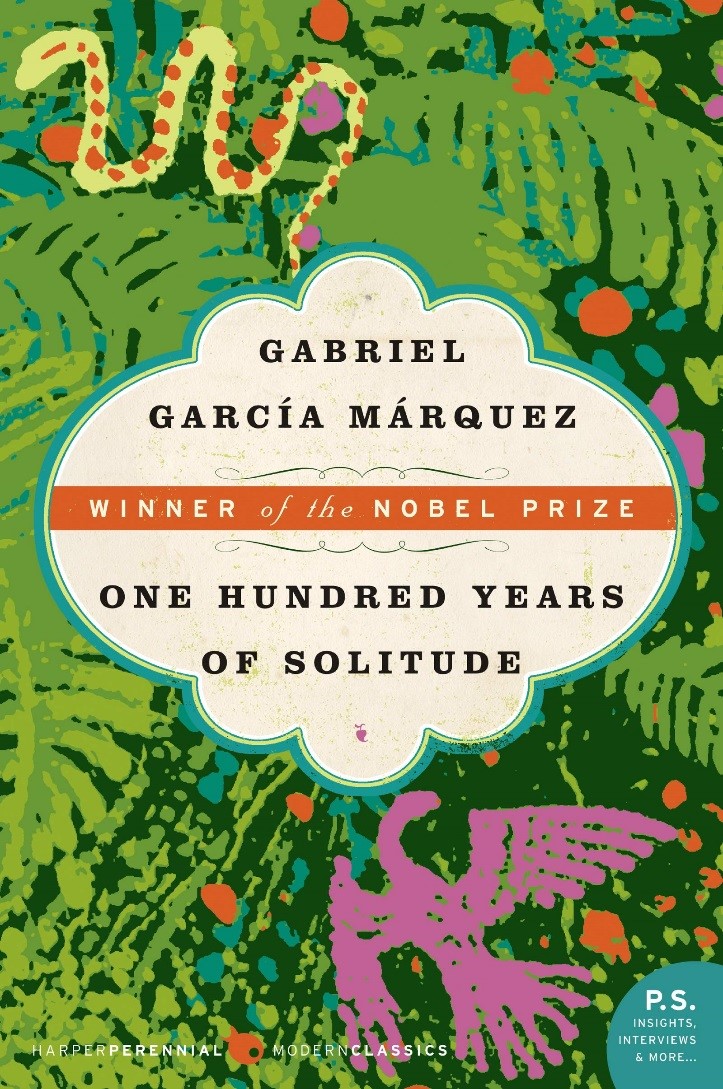
One Hundred Years of Solitude by Gabriel Garcia Marquez is a novel written to encapsulate post-colonial Latin America through the first-hand perspective of the author. The central focus of the story, the Buendia family and the fictional town of Macondo, reflects the real-life political and social turmoil of Colombia in the 1900s, albeit condensed into the span of several generations. In one of the more famous examples of the genre, the author uses magical realism to interpret the emotions of the town as a whole and show that while fantastical things are occurring, what is realistic can be equally absurd. The book has become a classic in Latin American writing, winning the Nobel Prize for literature in 1982. The characters live through overarching historical events while also dealing with the fictional drama of the town day-to-day.
The story has no clear main character and instead follows the entire Buendia family beginning with Jose Arcadio Buendia and his wife Ursula, the founders of Macondo, to Aureliano, the last Buendia descendant five generations later. The town and its inhabitants live in isolation from the rest of the world, causing them to develop slowly and separately. The vast plot includes a diverse range of events, from civil war between liberal and conservative powers in Colombia(reflecting the Thousand Days’ War from 1899-1902) to a magical rain that continues nonstop for five years. Garcia Marquez’s writing style vividly describes the colorful town of Macondo and smoothly uses magic to make emotions more tangible. The tone is objective and almost disinterested as the author writes about the events that take place without inputting judgement or opinion.
One main point I think that the story conveys very well is the importance of knowing and understanding history. For example, the family members continuously name their children after themselves or an older relative, and the child then goes on to repeat the same mistakes of their namesake. Each generation is a reflection of the past one, creating a disastrous cycle of history. Their inability to recognize past faults ties the characters to fate and repetition, cautioning the readers against ignorance.
The book’s title speaks volumes towards both the story and Garcia Marquez’s thoughts on the political and social conditions of Latin America in the 20th century. Each character makes effort towards finding love and fulfillment, but as their life progresses they end up increasingly isolated and ultimately alone in death. The situation of each character reflects the town as well. Built in separation, the town slowly integrates the outside world, creating a stark contrast between the two. This point is emphasized as they receive technology such as the railroad and magnets that baffle the residents of Macondo even though the story seems to take place in the late 1800s to mid-1900s. Even though the town is exposed to other societies, it never fully integrates because by the end of the story, Macondo and everyone who lives there are wiped away from the slate of history, almost as if it never occurred. This leaves questions as to the author’s intention. Was this full-circle ending fated, or was it the characters’ actions that led to their conclusions? With its prevalent historical context, does Garcia Marquez hint at a new period of history, or further repetition of history as no one is there to remember the past? Social change throughout Latin America left room for literary interpretation as its own “one hundred years of solitude” transformed culture and society from the colonial to modern era.
Full of family drama and fantasy, I would recommend this book to anyone interested in magical realism as this book does a very good job of making the fantastical elements seem grounded in reality and fit within the context of the story. Overall I would rate this book 8/10. The large cast of characters(many of which have the same name) and references to the past and future can make the story confusing. The story is often outlandish with many ups and downs, but the plot flows naturally even if it is occasionally slow. While this is difficult to follow at times, I think it is worth reading because Gabriel Garcia Marquez’s combination of reality and magic gives readers an insightful look into history.
